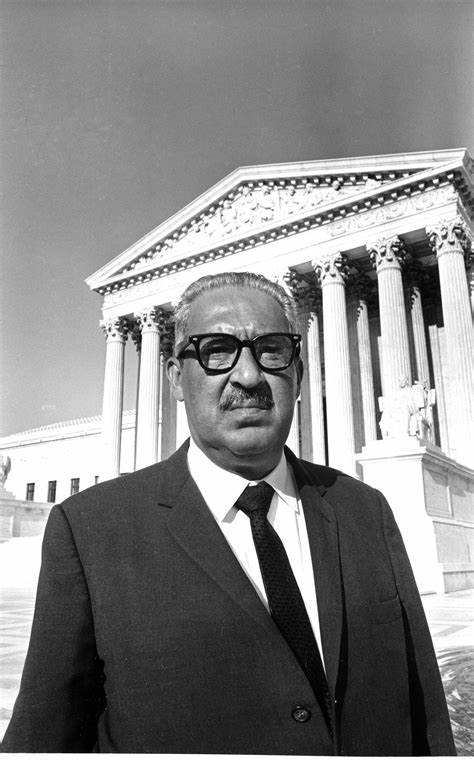
An historical image of Justice Thurgood Marshall.
Presented by New Repertory Theatre and Central Square Theater
Written by George Stevens, Jr.
Directed by Benny Sato Ambush
Starring Joshua Wolf Coleman
September 18 to 20 at 7:30PM
Starlight Square
84 Bishop Allen Drive
Cambridge, MA 02139
Critique by Afrikah Smith
“The law is a weapon if you know how to use it.” – Justice Thurgood Marshall
Cambridge, MA — In light of the passing of Justice Ruth Bader-Ginsburg, Thurgood reminds audiences of the obstacles BIPOC American citizens have overcome and continue to overcome every day, as we witness political events leading up to the 2020 elections.
Curious by how outdoor theatre was going to work, the thoughtful layout of Starlight Square surprised me. After checking in at will call, house staff escorted me to my seat following COVID-19 guidelines. Inside the space were socially distanced seating that met the gathering limit and made it more intimate. Although heaters are coming soon to Starlight Square, I recommend wearing warm layers.
Presented by New Repertory Theatre and Central Square Theater, Thurgood is a one-man show in tribute to the legacy of Justice Thurgood Marshall. Played by Joshua Wolf Coleman, he brings Thurgood Marshall to life for 80 minutes. He shares his legacy and anecdotes of his family, life, and uphill battles with segregation, racism, and the law. The plot branched from family history to Thurgood’s retirement as a supreme justice.
Thurgood Marshall entered the space accompanied by full-bodied jazz with trumpets, percussion, and a cane in hand. We are transported into Howard University School of Law, Thurgood’s alma mater, via this grand entrance. Feeling like a college student again, Coleman’s portrayal of Thurgood Marshall was that of a professor telling his life story to his lecture, hooking us in with the line: “I’ve gotten too old to keep secrets.”
The charisma that Coleman brought to Thurgood Marshall mesmerized me, and made me excited to hear more of Thurgood’s story in this one-man show. But, it left me conflicted for several reasons. I had qualms about what I had witnessed throughout the performance.
Words and music alone could not support the high stakes Thurgood Marshall had endured while taking on cases to overturn the 14th amendment and racial segregation. The times when inspirational music was used made Thurgood Marshall seem like a myth or caricature, instead of a Black man having to know the ins-and-outs of a two hundred-year-old judicial system that did not treat BIPOC citizens as equal (and still continues to show such biases today).
As much as I wanted to give the show the benefit of the doubt, it really showed that a BIPOC playwright did not write this. As much as I wanted this to be as grandiose as stories of slaying dragons and saving the day, it did not reflect the fact that this was waging war against the belly of the beast.
Coleman did a brilliant job in distinguishing the portrayals of court judges, president Lyndon B. Johnson, Charlie Houston, and other important figures while maintaining Thurgood’s character with gusto. But, I couldn’t help but wonder if perhaps Thurgood would have benefitted from being a play instead of a one-man show? Overwhelmed by so many characters and changes in locations, Thurgood would have been better suited as a drama to embody the extensive history presented to us.
During the entire show, we were stuck presumably in Thurgood Marshall’s school office. On stage was minimal office furniture, a stool, a fabric hanging with photos of significant figures in history and Thurgood’s life, and a podium. It was hard to distinguish where Thurgood was, as Coleman was limited to the confines of a small stage and static lighting.
Instead, I had to focus and listen for where we were in his storytelling. With only photos, names, and dates, it was hard to stay engaged and keep up when the space was stagnant. Understanding that time plays a role in this, I witnessed how quick and sometimes smooth a court case would be described, and I could not help but feel as though it undermined the weight and significance the court cases Thurgood Marshall worked on and overall seemed taken for granted.
It’s important to note that George Stevens, Jr. wrote Thurgood in the early 2000s. This leads to another conversation around plays that do not hold well with time. It pushes me to ask, whose stories do we tell? For whom do we tell them to, and why? This is especially true now when we are reckoning with our identities and histories, and how they intersect. With the rise of the Black Lives Matter movement, #BIPOCLivesMatter, and We See You White, American Theatre, it is crucial to center and uplift marginalized communities whose voices and stories have been historically suppressed and left unheard.
Regardless, Marshall’s legacy deserves recognition for his hard work and contribution towards creating civil equalities that have made a lasting effect on us all. As we gear up for the presidential election on November 3rd, we must not forget the power of the vote and our voices to create change. To learn more about Thurgood and ticketing information, go to https://www.centralsquaretheater.org/shows/thurgood/#.X2a_W5NKi3J.
